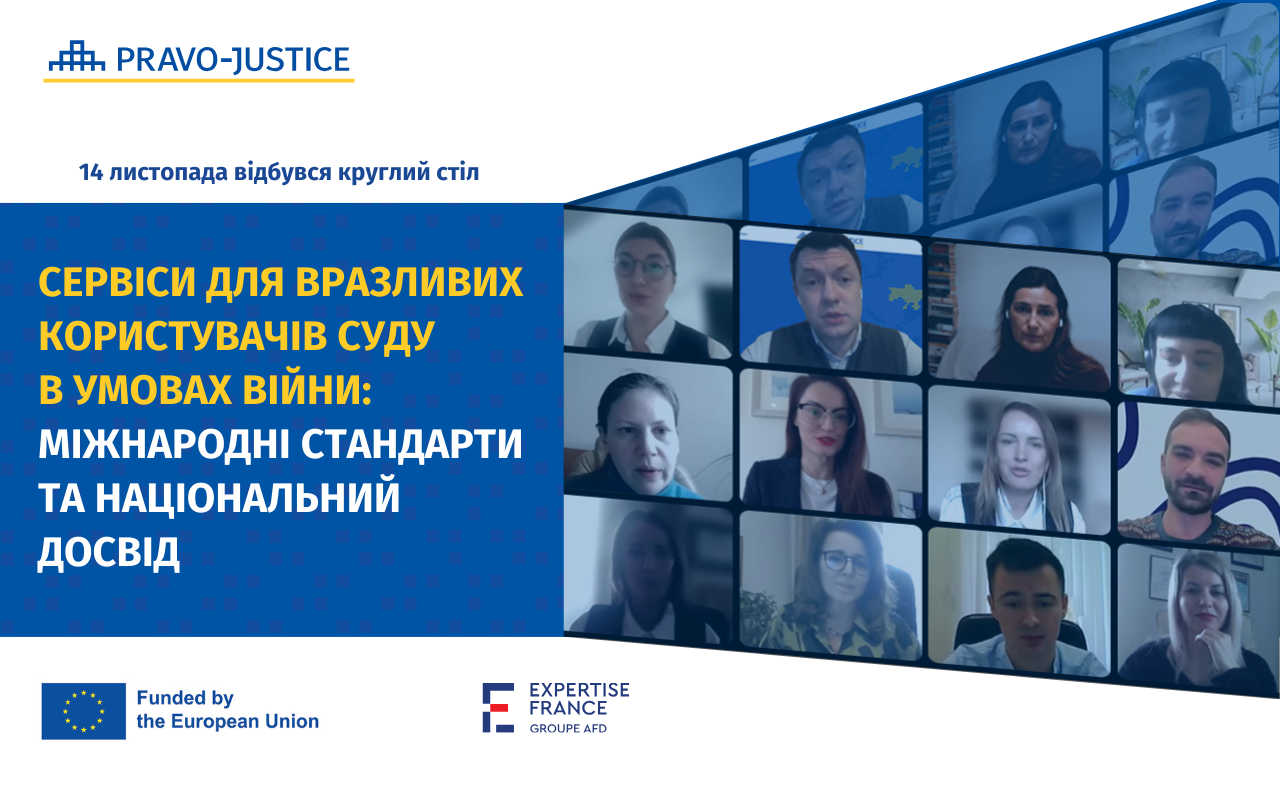Roundtable Discussion Held on the Topic "Services for Vulnerable Court Users in Wartime: International Standards and National Experience"

On November 14, at the initiative of EU Project Pravo-Justice, the final roundtable was held as a follow-up to the training course "Services for Vulnerable Court Users in Wartime: International Standards and National Experience". The event was attended by judges, court staff, and the Project’s national and international experts.
During the event, the participants considered new approaches to the implementation of services for vulnerable persons; discussed the challenges for access to justice in wartime, and also presented projects for the implementation of services for vulnerable court users under martial law, which had been developed by the participants to the five training course intakes.
The round table was moderated by Yevheniya Bondarenko, National Expert of EU Project Pravo-Justice, who shared her best practices in developing and strengthening services for vulnerable court users, including within the framework of the Model Courts Initiative.
"A ToT course has been developed on the implementation of services for vulnerable court users, which has been ongoing for five years now. Today, our community is happy to welcome the pool of trainers from the fifth intake. As of now, there are over 158 certified trainers who continue implementing solutions and ideas that EU Project Pravo-Justice has been developing for many years. For our part, we regularly coordinate, provide various platforms that rejuvenate the community and facilitate information exchange. Interinstitutional cooperation is yet another important component, because it is the involvement of representatives of various state authorities and the civil society to ensure the rights of vulnerable persons that leads to systemic changes and demonstrates the effectiveness of our work," emphasised Yevheniia Bondarenko.
In turn, Volodymyr Chaban, Judiciary Component Lead of EU Project Pravo-Justice, noted that preparing the judicial system to work with vulnerable users of court services was one of the Project’s cross-cutting areas of intervention. According to him, within the framework of the Model Courts Initiative, more than 60 courts have successfully implemented services for vulnerable court users.
"EU Project Pravo-Justice supported the development of a methodology for creating services for vulnerable court visitors. An important activity is also the training of trainers who have completed the courses and continue developing the community of professionals, including by teaching at the National School of Judges of Ukraine. The Project experts also created an Interactive Guide for Trainers of the training course, which is also disseminated by the NSJ. As a result of all these initiatives, we have already seen many examples of courts implementing and developing services for vulnerable groups on their own initiative, even in a difficult situation the Ukrainian judiciary is in because of the war," emphasised Volodymyr Chaban.
Anna Adamska-Gallant, trainer of the course and Key International Expert on Judiciary of EU Project Pravo-Justice (Poland), also spoke at the round table. She focused on the standards and principles that should be followed when working with victims and vulnerable persons. These include:
- Ensuring accessibility of services;
- Respecting victims and vulnerable persons, treating them with courtesy and dignity;
- Working to ensure safety of victims and vulnerable persons;
- Responding to individual needs;
- Supporting victims and vulnerable persons through a variety of services;
- Providing assistance through referral and coordination;
- Achieving quality through training.
In addition, Anna Adamska-Gallant emphasised the need to improve services through monitoring and evaluation.
"We need to assess services so that we have an understanding of what needs to be improved. To do this, it would be advisable to introduce a system of regular assessment of services, for example, through a survey. Another important mechanism could be the introduction of a system for submission of complaints that would allow victims to give feedback and seek compensation, if applicable. In addition, with the help of such feedback, there is an opportunity to better see and understand the problems that need to be solved," said Anna Adamska-Gallant.
For her part, Irina Urumova, trainer and course developer, International Expert of EU Project Pravo-Justice (Armenia), spoke about the importance of training for front-end workers of the support service for victims and vulnerable persons in the context of wartime. She noted, in particular, that with the beginning of the full-scale invasion of Ukraine by the Russian Federation, the ToT course had to be adapted to today’s realities.
"The number of internally displaced persons has increased dramatically. Interviewing victims and witnesses of war crimes is yet another major challenge. At the same time, it is now that we need to develop a strategy to ensure proper ToT in the post-war period. In my opinion, this process should be sustainable and consistent, because it is also an important component in the chain of restoring justice and holding all perpetrators liable for what they did," emphasised Irina Urumova.